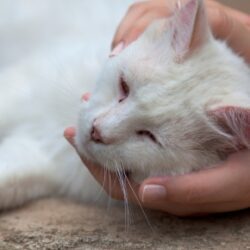Vet James Arding explores essential facts about cat leukaemia
As responsible cat owners, it’s crucial to stay informed about potential health threats that could impact our feline companions. One such concern is Feline Leukaemia Virus (FeLV), a serious and contagious disease that can affect cats of all ages. In this article, our Vet James Arding explores essential facts about cat leukaemia, discusses common symptoms, and emphasises the importance of prevention through vaccination. To ensure your cat’s wellbeing, we encourage you to take the proactive step of booking a cat vaccination appointment with our veterinary practice in Devizes.
Facts about Feline Leukaemia:
What is Feline Leukaemia? Vet James gets asked this question by many cat owners and so is sharing these facts below.
- Viral Infection: Feline Leukaemia Virus is a retrovirus that can affect cats worldwide. It primarily spreads through close contact with an infected cat, such as mutual grooming, shared food and water bowls, or bite wounds.
- Highly Contagious: FeLV is highly contagious among cats, making it crucial for owners of multiple cats or those whose cats interact with outdoor felines in and around Wiltshire to be especially vigilant.
- Various Strains: FeLV comes in different strains, each affecting cats differently. Some cats may effectively fight off the infection and become immune, while others may succumb to the disease.
Common symptoms of Cat Leukaemia:
- Lethargy: Cats infected with FeLV often exhibit increased fatigue and a lack of interest in activities they once enjoyed.
- Weight Loss: Unexplained weight loss can be a sign of various health issues, including FeLV. James advises to monitor your cat’s weight and contact us if you notice significant changes.
- Recurrent & Secondary Infections: FeLV suppresses the cat’s immune system. Cats with FeLV may experience frequent respiratory or gastrointestinal infections. They are also more susceptible to secondary infections and diseases such as leukaemia (cancer of the white blood cells), lymphoma, and anaemia.
- Swollen Lymph Nodes: Enlarged lymph nodes are a common symptom of FeLV. If you notice any unusual lumps or bumps on your cat, James stresses that you should contact us as soon as possible.
- Pale Gums and Mucous Membranes: FeLV can cause anaemia, leading to pale gums and mucous membranes. Our cat vets in Devizes can perform blood tests to check for anaemia and assess overall health.
Prognosis, treatment & management:
Feline leukaemia virus (FeLV) is potentially life-threatening. James explains that the prognosis for a cat diagnosed with feline leukaemia can vary depending on several factors, including the cat’s overall health, age, immune system status, and any concurrent medical conditions.
Cats can be classified into three main categories based on their FeLV infection status:
- FeLV Negative (no infection): Cats testing negative for FeLV typically have a good prognosis, as they are not infected with the virus.
- FeLV Positive (persistent infection): Cats testing positive for FeLV are infected with the virus. The prognosis for FeLV-positive cats varies depending on the stage of infection and the presence of associated health problems.
- FeLV Exposure (transient infection): Some cats may initially test positive for FeLV due to exposure to the virus but may clear the infection over time. These cats may have a better prognosis compared to persistently infected cats.
Sadly, while there is no cure for FeLV, James wants owners to know that supportive care and management can help improve the quality of life and extend survival in affected cats. This may include addressing secondary infections with antibiotics, managing symptoms such as anaemia or dehydration, providing a balanced diet, and minimising stressors. Regular veterinary check-ups at Estcourt Vets are essential for monitoring health and so your vet can adjust treatment as needed.
Preventing Cat Leukaemia:
- Vaccination: Vaccination is by far the most effective way to prevent Feline Leukaemia Virus. Our veterinary practice in Devizes offers safe and reliable vaccines that can significantly reduce the risk of infection. Book a cat vaccination appointment to ensure your feline friend is protected.
- Testing and Isolation: If you’re introducing a new cat to your household or have concerns about an outdoor cat’s health, it’s essential to conduct Feline Leukaemia testing and isolate any infected cats to prevent the spread of the virus. Contact Estcourt Vets for more information.
- Indoor Living: Keeping your cat indoors can significantly reduce their exposure to potential sources of infection in Wiltshire. If your cat enjoys the outdoors, you might want to consider creating a secure and enclosed outdoor space.
- Regular Veterinary Check-ups: Routine examinations allow our vets to monitor your cat’s health and detect any potential issues early on so be sure to schedule regular check-ups.
Book a Cat Vaccination appointment:
To ensure your cat’s protection against Feline Leukaemia Virus, Estcourt Vets strongly recommends booking a cat vaccination appointment at our Estcourt Street veterinary practice. Our experienced team are dedicated to providing the best care for your feline friends, and vaccinations play a crucial role in preventing and managing infectious diseases.
Don’t wait until it’s too late – take the proactive step of safeguarding your cat’s health.
Book a cat vaccination appointment today
< Back to articles Estcourt Vets Devizes
Estcourt Vets Devizes